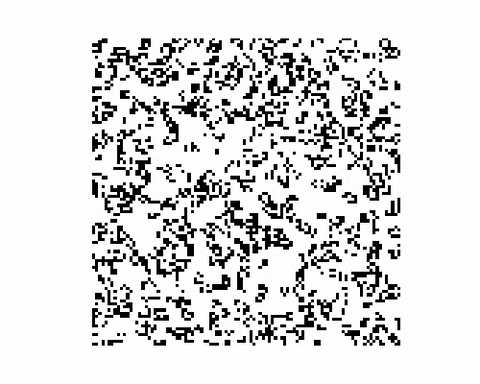Welcome to Game of Life, a Conway's Game of Life implementation created by Dimitrios Rammos as part of the Data Structures course in the Department of Informatics and Telecommunications (DIT) at the University of Athens. This project is developed in C and demonstrates advanced usage of data structures and algorithms.
The Game of Life is a cellular automaton devised by the mathematician John Conway. It's a zero-player game, meaning its evolution is determined by its initial state without requiring further input. This implementation allows users to input patterns in the .rle format and outputs the evolution of the game as a GIF animation.
If you want learn for Game-Of-Life read here.
Check here for patterns.
The official page by Conway's Game of Life.
-
files/: Contains the input
.rlefiles representing initial patterns for the Game of Life, including well-known patterns such as:glider-train.rlehebdarole.rlepentoad.rleship-in-a-bottle.rlebreeder-1.rlegospergundestroyedbygliders.rlenew-gun-1.rlep24shuttleshasslingoctagon2.rlep29pentadecathlonhassler.rleship-in-a-bottle.rletwo-glider.rle
-
include/: Header files for modularization, including:
ADTList.h,ADTMap.h,ADTVector.h: Custom data structure implementations.bmp.h,gif.h: Helpers for generating output images and animations.LifeState.h: Core game logic definitions.
-
modules/: C source files implementing the logic of the headers in
include/. -
program/: Contains the main program logic:
lifegame.c: Main entry point for the application.Makefile: Build instructions.output.gif: Generated GIF of the game’s evolution.
- Input Patterns in RLE Format: Supports
.rleinput files with initial patterns of the Game of Life. - GIF Animation Output: Generates an animated GIF (
output.gif) showcasing the evolution of the game. - Custom Data Structures: Implements efficient data structures (e.g., lists, maps, vectors) for managing game states.
- Modular Code: Separated into reusable modules and libraries.
- Predefined patterns such as gliders, guns, oscillators, and more.
- Examples available in the
files/directory.
- Uses optimized algorithms and custom data structures for efficient processing of large game grids.
To build and run the project, you need:
- A Unix-based operating system (tested on Ubuntu via WSL).
- A C compiler (e.g., GCC).
- Make build system.
git clone https://github.com/drammos/Game-Of-Life.git
cd Game-Of-Lifecd programRun the following command to compile and execute:
make run- Input files are located in the
files/directory. - Each file is in
.rle(Run-Length Encoded) format, which describes initial patterns for the game grid.
- A single file named
output.gifis generated, which visualizes the evolution of the game.
The core logic of the Game of Life, including:
- Grid Initialization: Reads
.rlefiles to initialize the game grid. - Rules Implementation: Applies Conway's rules to compute the next generation.
- State Management: Tracks and updates cells efficiently using custom data structures.
The main entry point for the program:
- Input Handling: Reads user-specified input patterns.
- Game Execution: Executes the game logic using
LifeState. - Output Generation: Outputs the results as an animated GIF.
Developed by Dimitrios Rammos, a passionate student of Computer Science at the University of Athens. This project showcases his expertise in:
- Data Structures and Algorithms.
- Systems Programming in C.
- Modular Software Development.
For any questions or suggestions, feel free to contact the author:
- GitHub: drammos
- LinkedIn: Dimitrios Rammos
